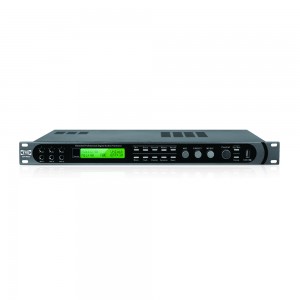DSP-9355 Audio Processor for Karaoke Rooms
Model: DSP-9355
Music section
SNR> 122 db (1KHz weighted)
Distortion (THD) ≤0.007% output XLR 1VIms 1Khz
Frequency response: 10HZ-20KHZ≤土1.0db
Maximum input level.....10Vpp土10%/20kohm
Maximum output: ≥9.8Vpp XLR out
Gain: 10db土1.0db
Microphone section
SNR ≥120dB
Distortion (THD): ≤0.07% output XLR 1Vrms 1Khz
Frequency response: 10HZ-20KHZ≤土3db
Maximum input level: 1Vpp土10%/10Kohm
Maximum output: ≥7Vrms XLR out/≥6.0VpP XLR out
Gain: 32db ± 1.5db
Other function description
Phone input interface: 4*6.35 phone sockets
Computer control interface interface: WIFI controller interface, USB driver-free interface,
Power supply: AC 220V/50HZ
Fuse: F2A/250VAC
Standard power supply: AC 220V/50HZ ± 10
Gross weight: 4.2kg ± 10%
Product size: 483x205x44mm
What is the function of the front-end processor?
The function of the front-end processor
A front-end processor is an audio processing device that plays a crucial role in sound systems. Here are some of the main functions of the front-end processor:
Modulation effect
The main function of the front-end processor is to modulate the sound. This means that after the sound is emitted, it will undergo a series of processing through the front-end processor , including noise reduction, overload, distortion, etc., and then be played back through the audio system. These processing operations can enhance the quality of sound and create different sound processor.
Amplify signal
The front-end processor is also responsible for signal amplification. Although this does not mean that it is a simple amplifier, its function is to amplify the modulated signal to a sufficient level for subsequent audio equipment to play normally. This amplification mainly refers to the amplification of signals, rather than the physical amplitude of sound.
Change tone color
The front-end effect device can produce various special sound processor by changing the waveform of the sound, modulating or delaying the phase of the sound wave, enhancing the harmonic components of the sound wave, and other measures. These processor can increase and change the timbre, making previously monotonous sounds more diverse and rich.
Wireless management
The front-end processor can also be controlled and adjusted by connecting to the Bluetooth function of a mobile phone or tablet. This is very useful for wireless management of audio equipment in KTV venues, such as volume control, microphone EQ, music EQ, reverberation and echo processor, etc.
In summary, the role of front-end processor in audio systems is multifaceted, from modulating sound, amplifying signals to changing timbre and wireless management, all of which reflect its importance in improving sound quality and user experience.



-300x300.jpg)

